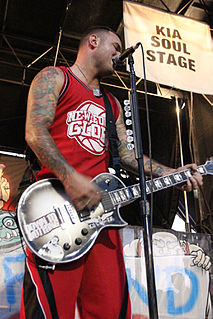A Quote by Stephen Mallinder
We were fortunate at that time we were working with Virgin, and with Flood, probably more well-known as Brian Eno's engineer now and U2's producer, etc. Even though we weren't working in a strictly popular music area, which was great, we were lucky enough to work with people who were on the cusp of those sort of things.
Related Quotes
And I think people who sort of glibly say, 'Well, you know, they're not going to handle security, UAE is a great ally,' four and a half years ago, they were not an ally, they were working with the enemy, and if those same people are still there today that were there then, these are real serious issues.
We thought that the odds of things working OK were up in the upper 90 percent or we wouldn't have gone. But the - there were some problems cropped up on the flight but was able to take care of those OK and - although they were things that we hadn't really trained that much for. But it was the time of the Cold War and so there were was a lot of pressure on the - to get going and the Russians were claiming that they were - Soviets were claiming they were ahead of us in technology.
What I saw over all that time were so many deals disappearing and producers disappearing, fewer movies getting made, and it just being a bit more difficult. Working with Joel, we were in a bit of a bubble because he was always making things that were working for the studio and that kind of thing. We were always in production on something.
The advertising men made it clear that there were two ways of looking at ideas in a war against fascism. Those of us who were working on the project believed ideas were to be fought for; the advertising men believed they were to be sold. The audience, those at home in wartime, were not 'citizens' or 'people.' They were 'customers.'
When I worked with General Electric, again this was soon after the Second World War, you know, I was keeping up with new developments and they showed me a milling machine and this thing worked by punch cards - that's where computers were at that time, and everybody was sort of sheepish about how well this thing worked because in those days machinists were treated as though they were great musicians because they were virtuosos on these machines.
Quakers are known for wanting to give back. Ban the bomb and the civil rights movement and the native American struggle for justice - those things were very, very front-burner in my childhood, as were the ideas of working for peace and if you have more than you need, then you share it with people who don't.
There is a principle of human affairs that goes back millennia, which is that you don't look in the mirror. You can trace this principle back to the Bible. The designated intellectuals of that time are called prophets, which is a mistranslation of a Hebrew word, but they were basically intellectuals, giving geopolitical analysis, criticizing the moral practice of leadership, etc. Now, these people were not treated very nicely. There were other intellectuals who were treated nicely, namely those who centuries later came to be called false prophets. These were the flatterers of the court.
Jim Jones used highly-edited videos and photos of Jonestown, showing what a supposed Eden it was. People were interviewed smiling and working in the fields, telling other church members to hurry down and join them. These interviews were staged; the people were told exactly what to say. Truth is, Jonestown never even produced enough food to feed everyone, and people were going hungry.



































